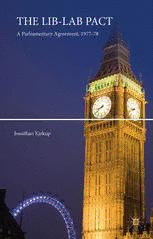
The Lib-Lab Pact: A Parliamentary Agreement, 1977–78 PDF
Preview The Lib-Lab Pact: A Parliamentary Agreement, 1977–78
The Lib–Lab Pact This page intentionally left blank The Lib–Lab Pact A Parliamentary Agreement, 1977–78 Jonathan Kirkup CardiffUniversity,UK ©JonathanKirkup2016 Softcover reprint of the hardcover 1st edition 2016 978-1-137-52768-4 Allrightsreserved.Noreproduction,copyortransmissionofthis publicationmaybemadewithoutwrittenpermission. Noportionofthispublicationmaybereproduced,copiedortransmitted savewithwrittenpermissionorinaccordancewiththeprovisionsofthe Copyright,DesignsandPatentsAct1988,orunderthetermsofanylicence permittinglimitedcopyingissuedbytheCopyrightLicensingAgency, SaffronHouse,6–10KirbyStreet,LondonEC1N8TS. Anypersonwhodoesanyunauthorizedactinrelationtothispublication maybeliabletocriminalprosecutionandcivilclaimsfordamages. Theauthorhasassertedhisrighttobeidentifiedastheauthorofthiswork inaccordancewiththeCopyright,DesignsandPatentsAct1988. Firstpublished2016by PALGRAVEMACMILLAN PalgraveMacmillanintheUKisanimprintofMacmillanPublishersLimited, registeredinEngland,companynumber785998,ofHoundmills,Basingstoke, HampshireRG216XS. PalgraveMacmillanintheUSisadivisionofStMartin’sPressLLC, 175FifthAvenue,NewYork,NY10010. PalgraveMacmillanistheglobalacademicimprintoftheabovecompanies andhascompaniesandrepresentativesthroughouttheworld. Palgrave®andMacmillan®areregisteredtrademarksintheUnitedStates, theUnitedKingdom,Europeandothercountries. ISBN 978-1-349-57632-6 ISBN 978-1-137-52769-1 (eBook) DOI 10.1057/9781137527691 Thisbookisprintedonpapersuitableforrecyclingandmadefromfully managedandsustainedforestsources.Logging,pulpingandmanufacturing processesareexpectedtoconformtotheenvironmentalregulationsofthe countryoforigin. AcataloguerecordforthisbookisavailablefromtheBritishLibrary. AcatalogrecordforthisbookisavailablefromtheLibraryofCongress. Contents ListofTablesandFigures vi Acknowledgements vii Introduction 1 1 Cross-PartyCo-operationinBritishPolitics,1945–1977 4 2 Build-UptotheLib–LabPact,1974–1977 26 3 Cross-PartyDiscussions,17–20March1977 40 4 Lib–LabDiscussions,17–23March1977 49 5 CabinetDiscussionsontheLib–LabAgreement 83 6 TheLib–LabConsultativeMechanism 97 7 LiberalPartyReactiontotheLib–LabPact 126 8 PolicyImplicationsoftheFirstPhaseofthePact 155 9 TheRenewaloftheLib–LabAgreement 165 10 TheSecondPhaseoftheLib–LabPact,July–September 1977 182 11 TheFinalPhaseoftheLib–LabPact,October1977–August 1978 193 Conclusion 219 Notes 223 Bibliography 244 Index 251 v Tables and Figures Tables 6.1 LiberalPartyshadowadministration 101 6.2 ListofmeetingsoftheLib–LabConsultativeCommittee 103 7.1 ThreattoincumbentLiberalMPsinthegeneralelection ofOctober1974(swingrequiredtobeunseated) 142 9.1 SwinginsupportoftheLabourandLiberalParties, 1974–1979(periodoftheLib–LabPacthighlighted) 169 Figures 9.1 OpinionpollingduringtheperiodoftheLib–LabPact (Gallup)(ButlerandButler,1994)p.255 170 vi Acknowledgements Asiscustomary,itisonlyrighttosaythatthisbookwouldnothavebeen possiblewithoutthehelpandencouragementofcolleagues,friendsand family. From Cardiff University, the patience and advice of Pete Dorey andStephenThorntonwereespeciallyimportant.PeterDonaldsongave invaluable assistance through the drafting process. Sincere thanks also gotothosewhoagreedtobeinterviewedbyme,especiallySirKenneth Stowe,whowassokind-hearted,andMichaelSteed,whogavemefood and lodgings. However, a very special thank-you and much love are reservedformyMumandDad,Kathy,RichardandHannah. vii Introduction Since the Conservative–Liberal Democrat coalition of 2010, there has been renewed interest within British academia in the subject of coali- tionsandcross-Partyagreements,althoughitremainsonlyasmallpart of the wider literature of coalition bargaining.1 In spite of this, the ‘Lib–LabPact’,withitsuniquestatusastheonlyformalcross-Partypar- liamentaryagreementinnationalpoliticsbetween1945and2010,has beenlargelyabsentfromtheacademicliteratureonthesubject–thank- fully,thisabsencehasmadethisbookpossible.Itis,however,necessary to establish why this topic has not been the subject of more rigorous academicstudyandwhatdevelopmentshaveoccurredtomakethisin- depth academic analysis possible. Its relative neglect may be explained bythedifficultyoverclassification.TheLib–LabPact,bydefinition,was notaformalcoalition;norindeedwasita‘confidenceandsupply’agree- ment. The Pact has been regarded as a ‘grey area’ in terms of analysis of coalition forming, party systems or political parties. For students of coalition theory it does not fit easily into the standard models and so hasbeenlargelyoverlooked.2 For those examining the British political system, the Pact is often viewed as little more than a rather annoying caveat or footnote, inter- sectingthebroadernarrativeonthetypologyoftheBritishpartysystem. Sartori(1976)viewedBritainbetween1945and1970astheperfecttwo- party system. Meanwhile, the British party system between 1979 and 2010hasbeencharacterisedbylongperiodsofsingle-partydominance, bytheConservativePartybetween1979and1997andtheLabourParty between 1997 and 2010. This later historical narrative subsumed the intensespeculationwithintheacademicliterature,concurrentwiththe Lib–Lab Pact, which speculated about whether British politics was in factdivertingtoamulti-partysystem.Aseriesofpublicationsreassessed the British political system, often with an emphasis on minor parties, 1 2 TheLib–LabPact hung parliaments and minority government.3 The fact that the 1980s and1990s,incontrasttothespeculationnotedabove,werenotcharac- terisedbyperiodsofminoritygovernmentsorhungparliamentsmeant that the Lib–Lab Pact, as an example of cross-party co-operation, had no substantive legacy. It did not achieve one of its primary aims, a realignmentinBritishpolitics.Equally,itisimportanttonotethePact had no discernible impact on the formation of the SDP or the subse- quentSDP–LiberalAlliance.4 Consequently,thedominantnarrativeon thePact,withintheacademicliterature,hasbeenthatitwaslittlemore thanapragmaticresponsebyaprostrateLabourPartygoverningwith- out a parliamentary majority, facing an impending vote of confidence and a subsequent general election, which a beleaguered Liberal Party equallywishedtoavoid.5 Clearly,themerefactthataneventorissuedoesnotfitwithinamodel typology or a standard political narrative does not automatically pre- clude it from further academic study. Why then has the Lib–Lab Pact beenoverlooked?Perhapsthemostimportantreasonfortheabsenceof anyin-depthacademicanalysisundertakeninthelast30yearshasbeen the existence of two books, published almost contemporaneous with the Lib–Lab Pact and written by two leading protagonists. The first is MichieandHoggart(1978)ThePact:TheInsideStoryoftheLib–LabGov- ernment, 1977–78. The second is David Steel’s own publication on the Pact: A House Divided: The Lib–Lab Pact and the Future of British Politics, large sections of which were transposed in Steel’s 1989 autobiography Against Goliath. In the absence of primary source material, these publi- cations have largely acted as the ‘core texts’ for those researching the period.6 While both books are broadly historically accurate, there are clear problems with relying on these works as the definitive retelling of the Lib–Lab Pact. To address Michie and Hoggart first, their book was publishedbeforetheconclusionofthePact.Theproblemshereareself- evident: retrospective analysis and the placing of the Lib–Lab Pact in a wider political context are clearly precluded. Second, the book was published not as an academic study but as a commercial endeavour. Simon Hoggart, the co-author, was a journalist for The Guardian news- paper. As such, as Michael Steed observes, the style and prose are not academicintoneandareattimessensationalist.WhileAlistairMichie, politicalaidetoDavidSteelduringmuchoftheLib–LabPact,didhave accesstomostoftheLiberalPartymaterialrelatingtothePact,Labour Partyandofficialgovernmentdocumentswerenotathisdisposal.7 The reliancebyacademicsonMichieandHoggart(1978)andSteel(1980and
